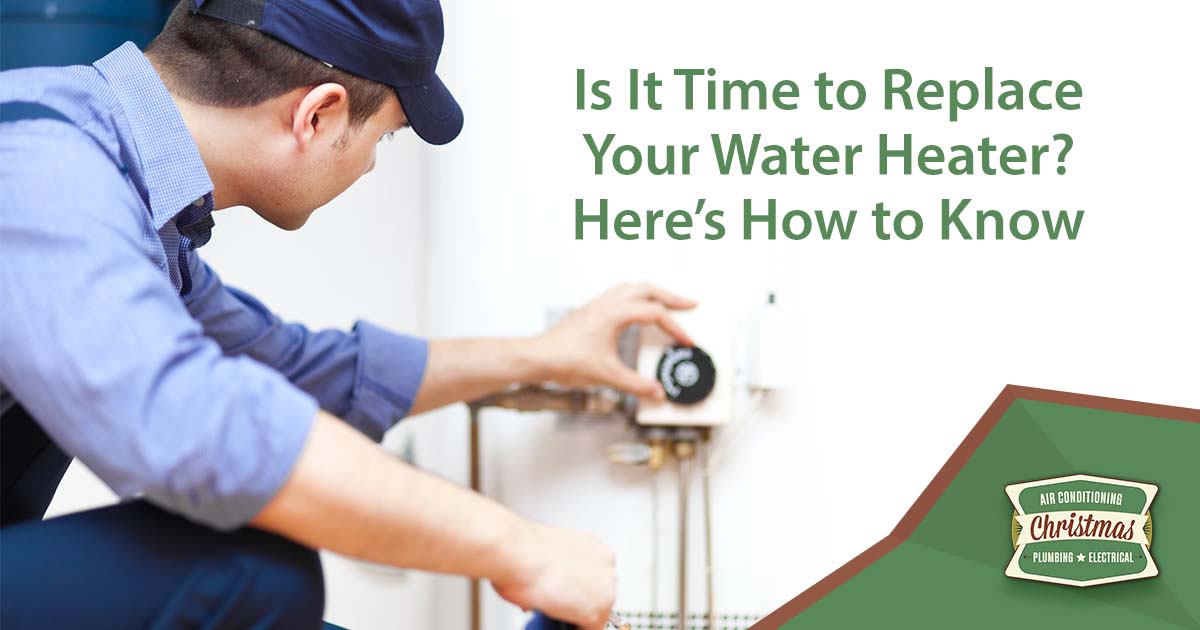Many homeowners don’t think about their water heater until something goes wrong. Whether the hot water runs out too fast, the tank starts leaking, or the utility bills suddenly spike, knowing when to replace a water heater becomes a critical decision. Christmas Air Conditioning and Plumbing offers professional water heater replacement services across Denton and the Dallas-Fort Worth area.
How Long Do Water Heaters Typically Last?
A standard tank water heater usually lasts between 8 to 12 years, while tankless models can perform efficiently for 15 to 20 years with regular maintenance. The actual lifespan depends on several factors, including water quality, installation method, frequency of use, and whether the unit receives annual flushing or inspection.
If your current water heater is approaching the 10-year mark—or has already surpassed it—it may be time to evaluate its condition. Homeowners should check the serial number on the unit to determine its manufacturing date. Even if it’s still working, an older water heater is more likely to develop issues and operate less efficiently.
Understanding how long a water heater lasts is a key part of deciding when it’s time to replace rather than repair. Aging systems are more prone to leaks, inconsistent heating, rust buildup, and energy inefficiency. Addressing these problems early can prevent unexpected breakdowns and avoid costly emergency replacement.
If unsure about the age or condition of the system, it’s best to schedule a professional inspection. A licensed plumber can assess whether repair is still a viable option or if water heater replacement is the more cost-effective choice.
Common Signs It’s Time to Replace a Water Heater
Knowing the warning signs early can help prevent property damage, water outages, and high utility costs. While not every issue necessitates a full replacement, the following problems are strong indicators of when to replace a water heater. Over time, even well-maintained units begin to show signs of wear and reduced performance. Ignoring these symptoms can lead to sudden failures, water leaks, and costly emergency repairs. Homeowners should pay close attention to how their water heater behaves during daily use. Small changes in water temperature, pressure, or quality may point to internal damage or corrosion. Identifying these issues early can help avoid unexpected breakdowns and ensure continuous access to reliable hot water.
Inconsistent or Inadequate Hot Water
One of the most common signs of a failing unit is running out of hot water too quickly or experiencing temperature fluctuations. If showers go cold faster than they used to, or if water never gets fully hot, the heating element or tank capacity may be compromised. This often signals the need for replacement—especially in older units that struggle to keep up with household demand.
Rust-Colored Water or Metallic Smell
If hot water coming from faucets appears discolored or smells metallic, corrosion may have developed inside the tank. Rust inside a water heater typically indicates that the internal lining or anode rod is deteriorating. Left unaddressed, this will eventually lead to leaks or tank failure. Replacing the unit is typically safer and more reliable than trying to fix internal corrosion.
Strange Noises From the Water Heater
Popping, rumbling, or banging noises often indicate sediment buildup at the bottom of the tank. Over time, this buildup hardens and causes the system to overheat, leading to energy waste and tank damage. While flushing can sometimes help, repeated noise or reduced performance suggests the water heater is nearing the end of its life.
Leaks or Water Pooling Around the Tank
Any visible water around the base of the unit is cause for immediate concern. Even small leaks can lead to major water damage if ignored. In most cases, a leaking tank cannot be repaired and will need to be replaced entirely. Catching this early prevents additional damage to flooring, walls, or surrounding fixtures.
These signs should not be ignored. Homeowners experiencing any of these issues should consider contacting a qualified plumbing technician to evaluate the system and determine when to replace the water heater safely and cost-effectively.
Repair vs Replacement: How to Decide
Many homeowners struggle to decide whether to repair their existing water heater or move forward with a full replacement. While some problems can be fixed with minor repairs, others indicate it’s time for a new system. Understanding the difference can help prevent wasted money on short-term fixes.
A good rule of thumb is the 50% rule: if the repair cost is more than 50% of the price of a new water heater—and the current unit is over 8 years old—replacement is usually the smarter option. Additionally, if the unit has required frequent service visits in the past two years, those costs can quickly add up.
Another consideration is how well the system meets current household demands. If a growing family is using more hot water than the unit was originally sized for, replacing it with a properly sized model may improve performance and comfort.
Repair is still a reasonable option in cases where:
- The unit is under warranty
- The problem is isolated (e.g., a faulty thermostat or heating element)
- The system is under 6 years old and has had minimal issues
On the other hand, replacing the water heater makes more sense when:
- The tank is leaking
- Performance issues are recurring
- Energy bills are steadily increasing due to inefficiency
- The unit is nearing or past its expected lifespan
Christmas Air Conditioning and Plumbing provides honest assessments to help Denton and DFW homeowners determine the most cost-effective solution based on system age, condition, and usage.
Energy Efficiency: A Key Reason to Replace a Water Heater
Many older water heaters operate at low efficiency, leading to higher monthly utility bills. Even if the unit still functions, an outdated system could be costing more than it should in terms of energy usage. For homeowners wondering when to replace their water heater, energy efficiency is a crucial factor to consider.
Newer models are designed with improved insulation, smarter controls, and faster heating cycles, helping households save on electricity or gas. Upgrading to a high-efficiency water heater—whether a tank or tankless model—can reduce energy usage by 10% to 50%, depending on the age and condition of the existing system.
Some high-efficiency models qualify for federal tax credits or local utility rebates, which can lower the upfront cost of replacement. These incentives, combined with long-term energy savings, make replacing an older unit a more affordable decision over time.
Homeowners in the Denton and Dallas-Fort Worth area may also notice that their energy costs rise seasonally when an inefficient water heater has to work harder. Inconsistent water temperature and long recovery times are signs that the unit is wasting energy and nearing the end of its service life.
If rising utility bills have become a concern, it may be time to explore water heater replacement options that offer better performance and lower costs.
When to Replace a Tankless Water Heater
Tankless water heaters have a longer lifespan than traditional tank units, but they are not immune to wear and performance issues. Homeowners should understand when to replace a tankless water heater, mainly if they rely on it for continuous hot water throughout the day.
A well-maintained tankless unit can last up to 20 years, but several signs may indicate that replacement is needed:
- Reduced water pressure or inconsistent hot water output
- Error codes appearing frequently on the digital display
- Corrosion on internal components, particularly the heat exchanger
- High mineral content in the water causes scale buildup, even with descaling efforts
Tankless units are sensitive to water quality and usage habits. In homes with hard water and high daily demand, performance may start to decline sooner than expected. If descaling and part replacements no longer resolve the issues, it’s a sign the system is reaching the end of its functional life.
Additionally, older tankless models may not offer the same efficiency or features as newer systems. For homeowners upgrading bathrooms or kitchens, replacing the unit can ensure the hot water supply keeps up with modern fixtures and higher flow rates.
If the tankless unit is over 15 years old and starting to require repeated service, a professional water heater replacement may be the most reliable solution.
Choosing the Right Replacement Water Heater
When the time comes to replace a water heater, selecting the right model is crucial for long-term comfort, optimal performance, and energy efficiency. Denton and DFW homeowners should consider several factors before making a decision.
Tank vs. Tankless: Which One Is Right?
Traditional tank water heaters store and heat a fixed volume of water, typically 40 to 80 gallons. They are generally less expensive upfront and work well for households with predictable water usage.
Tankless water heaters, on the other hand, heat water on demand and never run out of hot water. While they cost more initially, they offer greater energy efficiency and take up less space—making them ideal for modern homes or families with high hot water needs.
Sizing for Household Demand
Choosing the right size is critical. A unit that’s too small will run out of hot water frequently, while an oversized model may waste energy. For tank models, size depends on the number of people in the home and peak water usage. For tankless systems, the flow rate (measured in gallons per minute) must match the number of simultaneous hot water tasks—such as showers and laundry.
Fuel Type Considerations
Most homes use either natural gas or electricity to power their water heaters. In some cases, propane or hybrid models may be available. Gas water heaters generally have faster recovery rates and lower energy costs, but electric models can be easier to install and maintain. Homeowners should consider utility availability and cost when making a decision.
Working with a licensed plumber ensures that the selected unit is correctly sized, energy-efficient, and compliant with local plumbing codes and regulations. Christmas Air Conditioning and Plumbing helps homeowners compare options and choose the best replacement based on lifestyle, budget, and home layout.
Schedule Your Water Heater Replacement with Christmas Air Conditioning and Plumbing
If you’re experiencing poor performance, rising energy bills, or ongoing repairs, it’s time to consider replacing your water heater. The licensed professionals at Christmas Air Conditioning and Plumbing provide honest assessments and expert installations for homeowners in Denton and the greater DFW area.
Don’t wait for a full breakdown—take control of your home’s hot water needs today. Fast response, fair pricing, and trusted plumbing service are just a click or call away.

